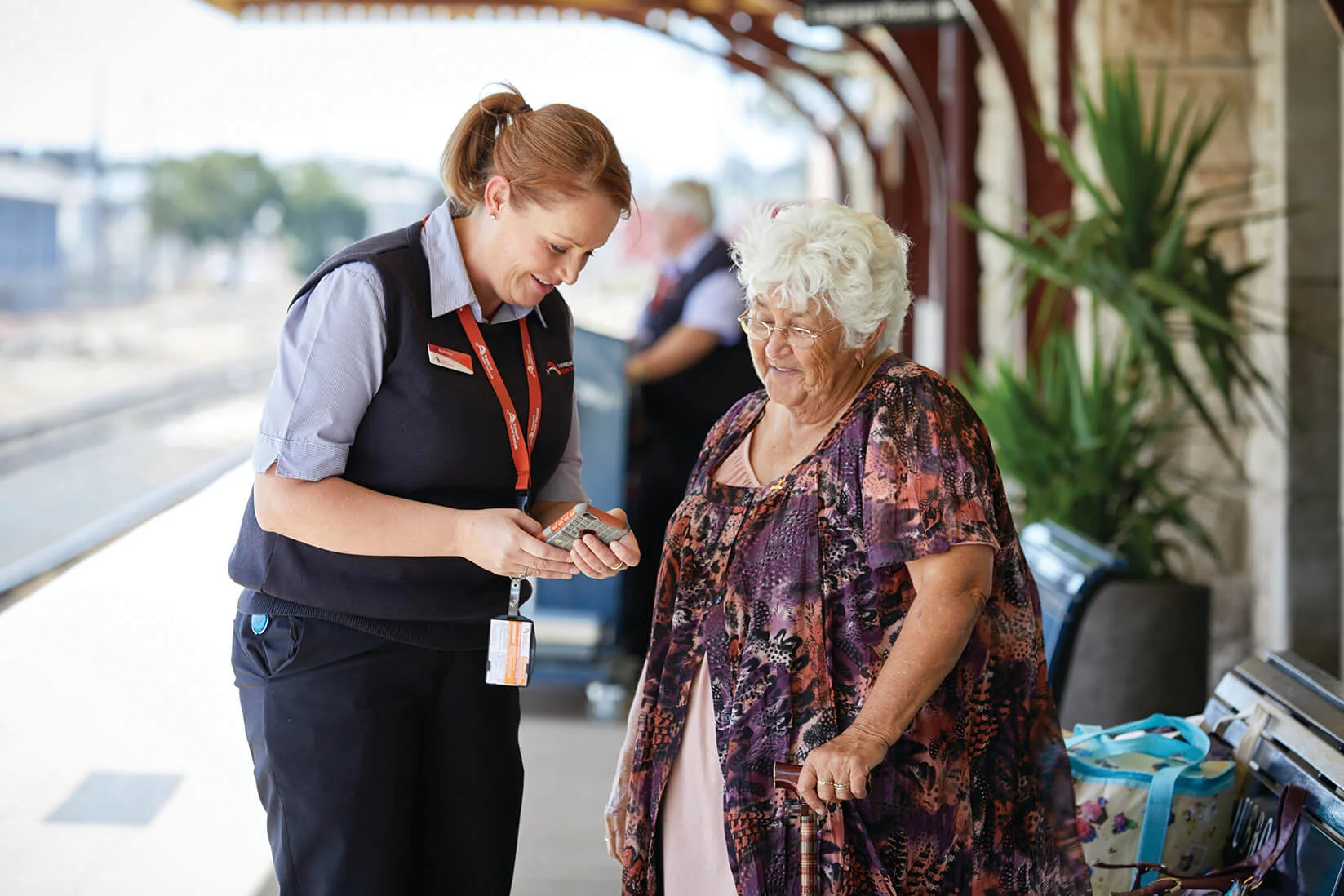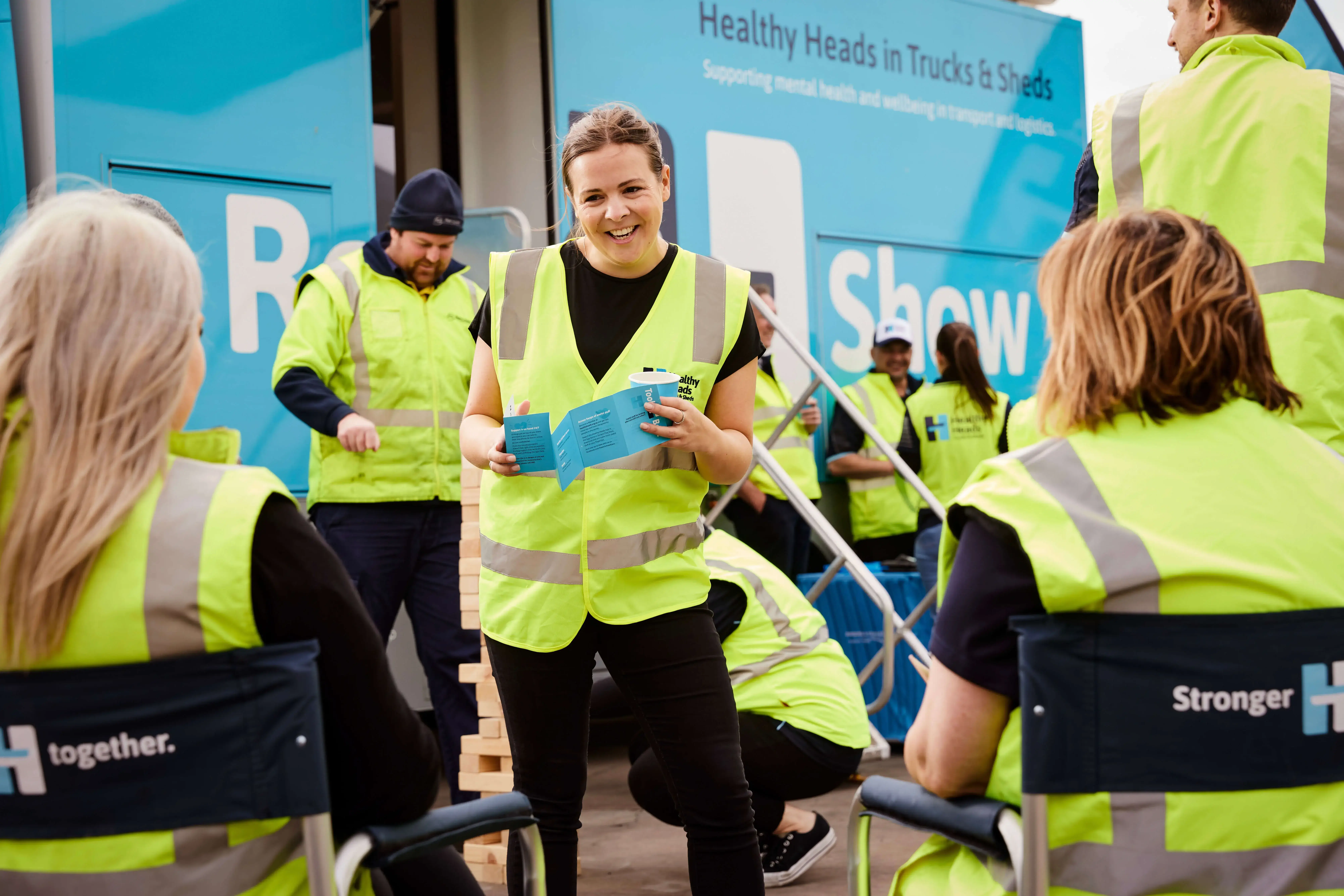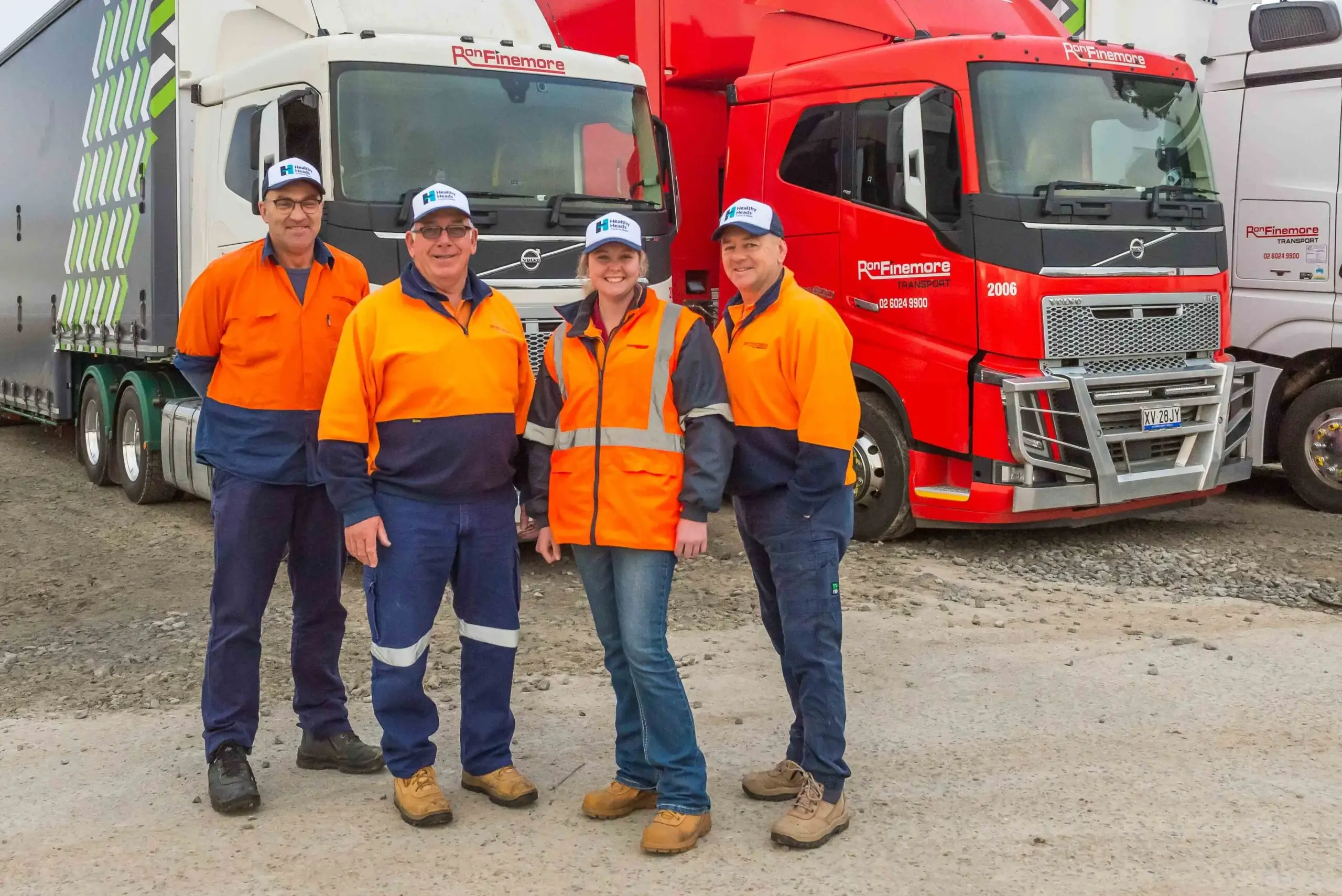Good mental health is important for everyone, regardless of the industry they work in. It is however a fact that in certain professions and working conditions, the risk of experiencing mental health problems and suicidality is greater. This can be for a number of different reasons including the demographic profile of workers and the nature of the work involved.
For the transport, logistics and supply chain industry, this is especially true. Transport workers in this industry have one of the highest rates of fatality among workers (Safe Work Australia, 2021), and a high incidence of mental health problems (Monash University, 2018).
In 2021, key players within this industry decided to come together to take strategic and practical action to improve the wellbeing, safety and life outcomes of workers. This entails a national collaboration between Mental Health First Aid® Australia, Healthy Heads in Trucks & Sheds (HHTS), Steering Healthy Minds (SHM), Toll Group, and TrackSAFE Foundation, to train people working in a diverse variety of transport, logistics and supply chain roles.
“We first became engaged with Mental Health First Aid through their workplace engagement team. We then formed a Transport and Supply Chain Working Group. This group worked to ensure that training with Mental Health First Aid reflected the unique and diverse workforce, and mental health related challenges across an expansive industry,” explains Melissa Weller, Director Industry Relations and Program Management, HHTS.
Mental Health First Aid Australia has been proud to develop tailored resources to meet the needs of this Industry, who employ over half a million Australians.

“It is mostly evident in the stories people share when they have approached another colleague or even a stranger, and they report they were able to offer help due to the knowledge and confidence they gained in the Mental Health First Aid course”
Maria Mazaheri, Chief Medical Officer, Aurizon

Why an industry-based approach is important
Mental health problems are wide-ranging and mental illness will impact close to 45% of Australians in their lifetime (AIHW, 2021). Workplaces have a unique role in supporting adults of working age who are experiencing mental health problems. Not only do they provide access for prevention, intervention and support, but they can unfortunately contribute to mitigating factors in developing, worsening or crisis point mental health.
Different industries have unique needs in terms of addressing mental health problems. Taking an industry-based approach is helpful in terms of:
1) Understanding audience needs and strengths
2) Targeting content and delivery of awareness and training programs
3) Enabling cross-industry collaboration for maximised reach and impact.
Jo Kitney, Managing Director, Kitney® and member of the SHM steering committee, provides an example based on the transport industry, “There are unique mental health challenges in the transport industry due to the nature of the work. Often, workers are isolated for long periods, exhibit lower physical health and are over exposed to accidents on the roads. As a result, there is a higher incidence of mental stress. The demographics seen in the transport industry can also be a compounding factor as the average transport worker is middle aged and male, making them less likely to be open about mental health.”
Mental health factors impacting the transport, logistics and supply chain industry:
1. Demographic – largely male cohort
While this industry employs people of varying ages, the average worker in the transport industry is a male aged 54 years old (HHTS, 2002). Traditionally ‘blue-collar’, male dominated industries can pose a challenge due to traditional stereotypes and stigmas related to help seeking. A ‘tough it out’ culture can prevail, and men are typically less likely to seek help for mental health problems than their female counterparts.
2. Unique stressors and work environment factors
People working in transport and supply chain related roles may experience some or all of the following mitigating factors, which can greatly impact stress levels and mental health:
• Physically demanding work
• Deadlines and other pressures
• Shift work and challenging work schedules
• Extended periods of isolation, e.g. truck and train drivers
• Geographic remoteness – lack of access to services
• Trauma experienced from negative incidents on rail or road
• Greater propensity towards poor diet and sleep habits
• Higher incidence of occupational violence
• Pressure from family situations exacerbated by work conditions
• Limited autonomy over workload and tasks.
3. Access to supports
Because Australia is a geographically large nation, and the transport, logistics and supply chain industry must meet demand across expansive metropolitan, regional, rural and remote areas, workers may have limited access to support based on their location. However, a collaborative industry approach to equipping people with the practical skills to provide mental health first aid, on the road, railway or work site, can strengthen the safety net of support available.
4. Relevance of content
Mental Health First Aid Australia training is applicable to all workplaces and industries, however there can be a need to tailor course resources, to better meet the needs of specific cohorts. Providing resources that relate to the specific work conditions and issues faced by workers is one of the benefits of an industry-based approach. In this instance, transport and supply chain specific scenarios were created to make the training more relatable and effective for use by HHTS, SHM, Toll Group and TrackSAFE Foundation.
Mental health in the industry – key facts and statistics
While every experience with mental health problems is unique there are over-arching national statistics that can assist us in understanding the extent of the challenge faced by the combined transport, logistics and supply chain industry.
- In Australia, research suggests that certain ‘high-risk’ industries have higher rates of suicide, incidence of mental illness and psychological distress – among them is the transport and logistics sector (Monash University, 2018).
- The transport, postal and warehouse industry has the third highest frequency rate for serious workers compensation claims in Australia (Safe Work Australia, 2021) and 8% of all mental health claims came from people across this workforce (Safe Work Australia, 2015).
- Around 22% of Australian truck drivers experience mental health problems (Safe Work Australia, 2021)
- There are over 1,200 road fatalities each year and over 44,000 significant injuries caused in collisions and road accidents (BITRE, 2021). Road-based workers are at greater risk of involvement or witnessing such incidents.
- There are over 89 fatalities and 1,880 near hits on Australia’s rail networks each year. Person-train collision or near misses can cause significant trauma and work-related stress for staff who witness or are involved in these incidents (TrackSAFE Foundation, 2022).
- Drivers in the transport industry commonly report problems such as loneliness, depression, chronic sleeping problems, excessive fatigue, and work stress from long hours and separation from family (OzHelp Foundation, 2020).
- Suicide is the leading cause of death for men aged 15 – 45 and a leading cause of death across other age groups (ABS, 2021). ‘Male dominated’ industries have a role to play in prevention and intervention.

Impact through collaboration
The case for Mental Health First Aid training is a practical one. Equipping more staff across workplaces with the confidence, knowledge and skills to recognise and respond to mental health problems, creates informal peer-to-peer care networks that complement formal mental health supports. This includes complementing workplace well-being programs. This broadens the opportunity for people who may otherwise miss out on accessing support.
Toll Group, one of Australia’s largest transport and logistics companies, who have been exemplifying the positive impacts of Mental Health First Aid training since 2016, have advocated for the importance of tailoring and flexibility. They have found ways to deliver Mental Health First Aid training with access for even the most ‘hard to reach’ audiences.
“We find our staff who work on the road one of the hardest groups to reach, yet they are also one of our largest workforce groups and one of the most vital for our mental health messages. Given their movements and availability, we’ve had to be more flexible in how we deliver training to build their skills and knowledge, and how they in-turn access support for themselves,” explains Ruth Oakden, GM Wellbeing, Toll, and SHM and HHTS working groups.
Aurizon, one of the TrackSAFE Foundation’s corporate supporters, has surveyed some of their staff about Mental Health First Aid training and found:
- Increased confidence to help someone in need and to start a mental health first aid conversation.
- Generated awareness about mental health in the workplace.
- A breakdown of stigma about mental health conversations.
- Reported use of new skills and knowledge to assist people with a wide variety of mental health problems and related challenges – including some that are quite complex and serious, such as people in crisis.
- Benefits of training reportedly extending beyond the workplace, with participants indicating they had also supported family, friends and other people in the community with their newfound skills.
“It is mostly evident in the stories people share when they have approached another colleague or even a stranger, and they report they were able to offer help due to the knowledge and confidence they gained in the Mental Health First Aid course,” says Maria Mazaheri, Chief Medical Officer, Aurizon.
Many partners have also demonstrated how training can be further embedded into strategic direction and business processes. HHTS continue to align the learning outcomes and increased capacity gained via Mental Health First Aid training with the Safe Work Australia framework developed to improve psychological healthy and safety, and the sector’s National Mental Health and Wellbeing Roadmap, which focuses on three pillars of mental health – prevention, protection and support.
Mental Health First Aid Australia looks forward to our continued work with this industry group. Collectively, we believe this initiative can have a significant long-term impact on the industry.
“This program has the opportunity to be truly transformational with continued saturation of transport workers trained in Mental Health First Aid. Not only at an individual level but at an organisational level via the peer support model,” says Laura Youl, Principal, Strategic Partnership, EML and SHM steering committee member.
Mental Health First Aid Australia would like to thank our partners in the Transport, Logistics and Supply Chain Industry. We are pleased to share their successes and welcome the next steps towards training more Australians to be equipped with Mental Health First Aid skills in their workplace.
If your workplace or industry group would like to discuss opportunities regarding Mental Health First Aid training, please contact our Workplace Engagement Team.


